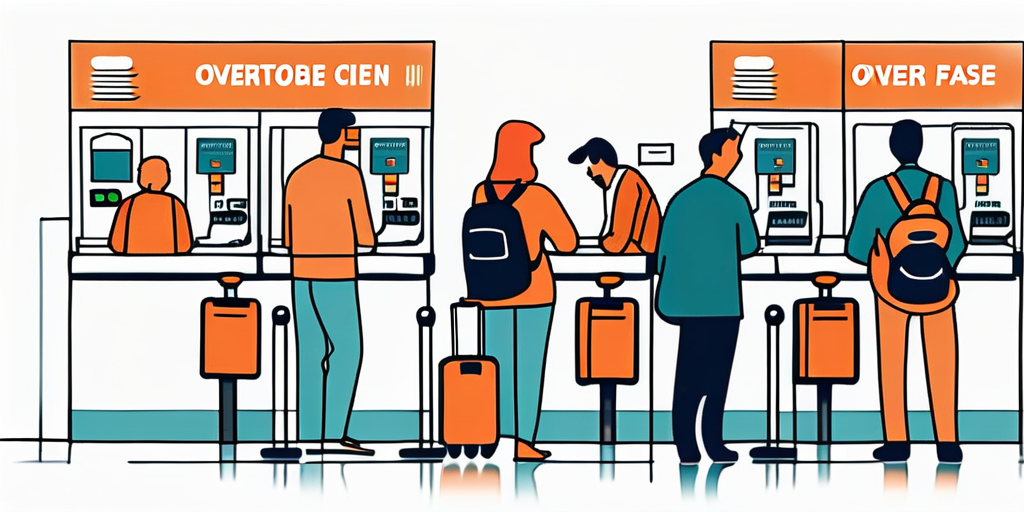How Does Overbooking Happen
Explore how overbooking happens in airlines. Learn about the causes, procedures, and impacts of overbooking on passengers and airlines.
Overbooking is a common phenomenon that occurs in various industries, such as airlines, hotels, and restaurants. It refers to the practice of accepting more reservations than the actual available capacity. Understanding the concept of overbooking is crucial to comprehending why it happens, the reasons behind it, the process involved, the consequences it can have, and how to mitigate its effects.
Understanding the Concept of Overbooking
Overbooking is rooted in the desire to maximize revenue and optimize business operations. By accepting more reservations than the available capacity, businesses aim to minimize the impact of no-shows and cancellations, which can lead to empty seats or rooms. Let's explore the basics of overbooking and its role in different industries.
 Overbooking is a strategic practice that requires a delicate balance between forecasting and risk management. It involves a thorough analysis of historical booking patterns, seasonal trends, and external factors that may influence customer behavior. By leveraging data analytics and predictive modeling, businesses can make informed decisions when overselling their services.
Overbooking is a strategic practice that requires a delicate balance between forecasting and risk management. It involves a thorough analysis of historical booking patterns, seasonal trends, and external factors that may influence customer behavior. By leveraging data analytics and predictive modeling, businesses can make informed decisions when overselling their services.
The Basics of Overbooking
At its core, overbooking involves accepting more reservations or bookings than the available capacity. This practice takes into account historical data, trends, and statistical probabilities to estimate the number of no-shows or cancellations that typically occur. By strategically accepting excess reservations, businesses aim to fill their capacity as much as possible.
Moreover, overbooking is not just about maximizing revenue; it also plays a crucial role in enhancing customer satisfaction. By ensuring high occupancy rates and minimizing empty spaces, businesses can create a sense of exclusivity and demand for their services. This can lead to a perception of popularity and desirability among customers, further driving future bookings and brand loyalty.
The Role of Overbooking in Different Industries
Overbooking is prevalent in various industries, including airlines, hotels, and restaurants. In the airline industry, it is a common practice to oversell flights, considering factors such as late cancellations and passengers missing their flights. Hotels also overbook rooms to account for last-minute cancellations and unexpected changes in guest plans. Even restaurants may accept more reservations than their dining capacity, as they anticipate last-minute cancellations or no-shows.
Furthermore, the concept of overbooking extends beyond just managing reservations; it also involves effective communication and customer service. Businesses must have robust protocols in place to handle situations where overbooking leads to customer inconvenience. This may include offering alternative arrangements, compensation, or upgrades to ensure a positive customer experience despite the initial overselling.
The Reasons Behind Overbooking
The decision to overbook is driven by several factors, primarily motivated by profitability and the need to manage no-shows and cancellations effectively. Let's explore the key reasons behind overbooking.
 Overbooking is a common strategy utilized by businesses in the hospitality and travel industries to ensure optimal utilization of resources. By intentionally accepting more reservations than available capacity, businesses aim to minimize the impact of last-minute cancellations and no-shows, ultimately maximizing their revenue potential.
Overbooking is a common strategy utilized by businesses in the hospitality and travel industries to ensure optimal utilization of resources. By intentionally accepting more reservations than available capacity, businesses aim to minimize the impact of last-minute cancellations and no-shows, ultimately maximizing their revenue potential.
The Profit Motive
One of the primary drivers of overbooking is the profit motive. Businesses want to maximize their revenue potential by filling as many seats, rooms, or tables as possible. By accepting excess reservations, they can increase their chances of maximizing occupancy and overall revenue.
Moreover, in industries where fixed costs are high and profit margins are relatively slim, such as airlines and hotels, overbooking can be a crucial strategy to ensure financial viability. By carefully balancing the risk of overbooking with the potential revenue gains, businesses can achieve a delicate equilibrium that benefits both the company and its customers.
Managing No-Shows and Cancellations
No-shows and cancellations can significantly impact a business's operations and revenue. By overbooking, businesses can minimize the impact of such occurrences. By carefully analyzing historical data and trends, businesses can estimate the likelihood of no-shows and cancellations and account for them by accepting additional reservations.
Additionally, overbooking allows businesses to maintain a steady flow of customers and optimize resource allocation. Rather than operating at less-than-full capacity due to unexpected cancellations, businesses can proactively manage their bookings to ensure maximum efficiency and customer satisfaction. This proactive approach not only benefits the business in terms of revenue but also enhances the overall customer experience by reducing the likelihood of service disruptions.
The Process of Overbooking
Overbooking involves a combination of predictive analysis and the implementation of effective reservation systems. Let's delve into the process of overbooking and the key elements involved.

Predictive Analysis and Overbooking
Predictive analysis plays a crucial role in overbooking. By analyzing historical data, booking patterns, and customer behavior, businesses can make informed decisions regarding overbooking. Statistical models and algorithms assist in estimating the likelihood of no-shows and cancellations, allowing businesses to accept excess reservations with a degree of certainty.
Furthermore, predictive analysis not only helps in managing overbooking but also aids in revenue optimization. By understanding demand fluctuations and customer preferences, businesses can set dynamic pricing strategies to maximize revenue while minimizing the impact of overbooking on customer satisfaction.
The Role of Reservation Systems
Effective reservation systems are essential for successful overbooking. These systems help businesses manage and track reservations, monitor the number of available seats or rooms, and facilitate communication with customers. Advanced reservation systems integrate with predictive analysis tools, allowing businesses to adjust their overbooking strategies based on real-time data.
Moreover, reservation systems also play a critical role in ensuring operational efficiency. By automating processes such as booking confirmations, reminders, and cancellations, businesses can streamline their operations and provide a seamless booking experience for customers. Integration with customer relationship management (CRM) systems further enhances the ability to personalize interactions and build long-term customer relationships.
The Consequences of Overbooking
While overbooking can benefit businesses by maximizing revenue and optimizing operations, it can also have significant consequences. Let's take a closer look at the impact it can have on customers and the legal and ethical implications involved.
Overbooking is a common practice in industries such as airlines and hotels, where there is a high probability of no-shows or cancellations. However, when overbooking is not managed effectively, it can lead to a domino effect of negative outcomes. For example, customers who have made reservations well in advance may find themselves without a seat on a flight or a room in a hotel due to overbooking, causing frustration and inconvenience.
Impact on Customers
Overbooking can lead to inconveniences and dissatisfaction among customers. When businesses are unable to accommodate all their reservations, customers may experience delays, have to settle for alternatives, or even be denied service altogether. This can tarnish the reputation of businesses and result in customer dissatisfaction.
Moreover, the impact of overbooking extends beyond just the immediate inconvenience. Customers who have had negative experiences due to overbooking are likely to share their grievances on social media platforms and review websites, further damaging the business's reputation and potentially deterring future customers.
Legal and Ethical Implications
Overbooking raises legal and ethical concerns. Businesses must ensure they comply with regulations and laws related to consumer protection and fair trade practices. It is essential to strike a balance between maximizing revenue and providing quality service to customers, ensuring no unfair advantage is gained at the expense of customers.
In some cases, overbooking can also lead to legal disputes and lawsuits if customers feel their rights have been violated. This can result in financial penalties and reputational damage for businesses found guilty of unfair or deceptive overbooking practices. Therefore, it is crucial for businesses to carefully consider the ethical implications of overbooking and prioritize customer satisfaction to avoid potential legal repercussions.
Mitigating the Effects of Overbooking
To minimize the adverse effects of overbooking, businesses implement various policies and strategies. Let's explore some of the approaches taken to mitigate the consequences.
Overbooking Policies and Practices
Businesses can develop clear and transparent overbooking policies, outlining the potential risks and providing alternatives or compensation in case of denied service due to overbooking. Effective communication, proactive notifications, and swift resolution in the event of overbooking can help mitigate the negative impact on customers.
One common practice in the airline industry, known as "bumping," occurs when a flight is overbooked, and passengers are involuntarily denied boarding. In such cases, airlines are required to compensate passengers according to regulations, which vary by region. These regulations often stipulate the amount of compensation based on the length of the delay caused by overbooking.
Customer Compensation Strategies
Compensation strategies can be employed to compensate customers affected by overbooking. This can range from offering free upgrades, discounts, vouchers, or refunds to demonstrating a genuine willingness to resolve any inconveniences caused by overbooking.
Moreover, businesses can go beyond monetary compensation and offer personalized gestures of goodwill to affected customers. This can include handwritten apology notes, complimentary services, or future discounts to rebuild trust and loyalty with customers who have experienced the inconvenience of overbooking.
In conclusion, overbooking is a complex and strategic practice aimed at maximizing revenue and optimizing business operations. While it can have benefits for businesses, it also presents challenges in maintaining customer satisfaction and adhering to legal and ethical standards. By understanding the concept of overbooking, its reasons, process, consequences, and mitigation strategies, businesses can strike a balance between efficiency and customer-centricity, ensuring their operations run smoothly while delivering quality service.
Get the Compensation You Deserve with ClaimCompass
If you've experienced the inconvenience of overbooking, flight delays, or cancellations, ClaimCompass is here to ensure you receive the compensation you're entitled to. Our expertise in EU Regulation 261/2004 allows us to evaluate your situation and help you claim up to 600€. There's no risk involved; using our compensation calculator is free, and we only charge a fee if we successfully secure your compensation. Don't let an overbooked flight set you back. Submit a claim today and let us take care of the rest, ensuring your air passenger rights are fully respected.
